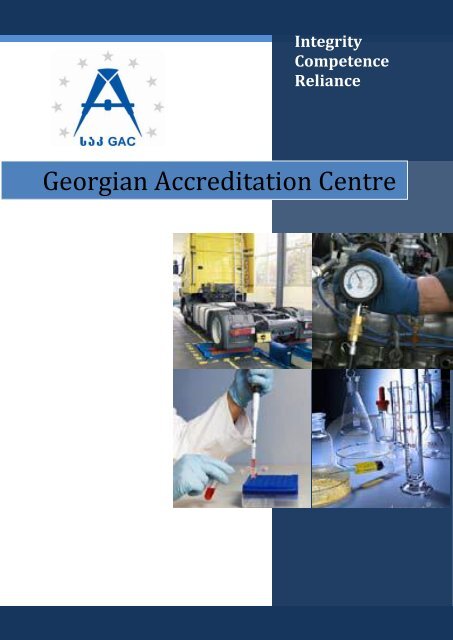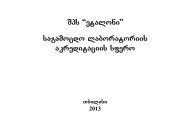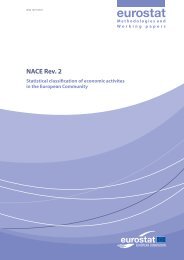Georgian Accreditation Centre
Booklet
Booklet
- No tags were found...
Create successful ePaper yourself
Turn your PDF publications into a flip-book with our unique Google optimized e-Paper software.
IntegrityCompetenceReliance<strong>Georgian</strong> <strong>Accreditation</strong> <strong>Centre</strong>
GreetingsDear Readers!The general economic development, including theglobalization trend, more and more enforces therole of product and service quality. Mostly everyconsumer choice is made after intensiveevaluation of product and service quality. Thisglobal demand for appropriate product/ servicequality and the satisfaction of customerexpectations can be met by the services ofaccredited conformity assessment bodies (CAB).The <strong>Georgian</strong> <strong>Accreditation</strong> <strong>Centre</strong> (GAC) is aLegal entity of public law institution operatingunder the state supervision of the Ministry ofEconomic and sustainable Development ofGeorgia and It provides a common system of<strong>Accreditation</strong> for different type of CABslaboratories,certification and inspection bodies.By the accreditation of CABs their competenceand reliance can be proved.On GAC Web-site a list of actual accredited CABscan be found, as well as information aboutaccreditation and application procedures andnews.GAC develops continuously and internalimprovements give confidence for further activitiesin order to satisfy the increasing global customerdemand for accreditation services.Progress in recent years would not have beenpossible without the professional staff and goodco-operation with the Ministry of Economic andsustainable Development of Georgia, with otherministries and feedback from the CABs.We hope you enjoy reading the Brochure and thatyou get closer to the topic accreditation in generaland to <strong>Georgian</strong> <strong>Accreditation</strong> <strong>Centre</strong> in specific!Director General GACPaata Gogolidze
ContentAbout accreditationAbout GACGAC Quality PolicyTasks of GACGAC organizationBenefits of accreditation<strong>Accreditation</strong> procedureWho can be accredited?<strong>Accreditation</strong> symbolsInternational CooperationContact
1. About accreditation<strong>Accreditation</strong> is a formal recognition of competence of a conformity assessment body (CAB).CABs can be laboratories (testing, calibration, medical), inspection bodies or certificationbodies (for Product, Persons or Management systems). Usually, accreditation is granted bythe national accreditation body. It acts according to the International rules under the authorityof the state. The national accreditation body of Georgia is called GAC – <strong>Georgian</strong><strong>Accreditation</strong> <strong>Centre</strong>.<strong>Accreditation</strong> is promoted by the European Union to establish the Common Market and isnow recognised internationally as the primary tool for breaking down technical barriers totrade, enabling faster and cost effective trade of goods and services. The logic ofaccreditation is convincing: if a CAB is recognised to be competent, the market can trust inthe certification or testing on conformity of the product with the stated requirements.Thus, there is no need for further control and goods can cross borders without delay oradditional costs. Thus, any economy interested in trade will strive for an internationallyrecognised accreditation body as GAC does.2. About GACThe <strong>Georgian</strong> <strong>Accreditation</strong> <strong>Centre</strong> -GAC- is the nationally recognised accreditation body ofGeorgia. Its mission is to deliver best accreditation services to the <strong>Georgian</strong> economy.<strong>Accreditation</strong> services are: granting accreditation surveillance of accredited bodies reaccreditation extension or reduction of scope Suspension or withdrawal of accreditation.The decisions about accreditation are prepared by an accreditation committee. Therecommendation is given to the Director General who will sign the relevant documents andtakes formal decision for granting of accreditation.In the case of a no positive decision the customer of GAC has a right to launch an appeal tothe appeals committee of GAC.GAC is operating in full compliance with the internationally applied standard ISO/IEC 17011and European practices which describe the basic codex of its behaviour and in detail how anaccreditation body has to be run.GAC was founded in 2006. It acts under the law “Code on safety and free movement ofproducts” from 2012. Fees for its activities are raised according to a fixed fee structure.
Meanwhile, GAC has granted about 450 accreditations, mainly in the fields of testing andcalibration laboratories and certification bodies. GAC has a permanent staff of 14 persons.Assessments at the CABs are done jointly with the permanent staff and the most skilledcontracted experts.Since 2011, GAC is an associated member of EA, the European cooperation for<strong>Accreditation</strong> and of ILAC, the International Laboratory <strong>Accreditation</strong> Council. It is nowamending its rules as to comply with the European practice in EA in order to becomeinternationally recognised as a member of a Multilateral Recognition Agreement.Such an agreement would facilitate export on a large scale as test reports or certificates fromaccredited <strong>Georgian</strong> bodies would be accepted worldwide which makes repeated testing orcertificates unnecessary.At present, GAC cooperates not only with EA and its committees but also with theaccreditation bodies from Turkey, Latvia, Germany and Belorussia.As GAC is a part of the national quality infrastructure, it cooperates intensively with thenational metrology institute, the standards body, market surveillance authorities and thegovernment.3. GAC Quality Policy“The National <strong>Accreditation</strong> Body –<strong>Georgian</strong> <strong>Accreditation</strong> Center (hereinafter referred to asthe „GAC”) is a Legal entity of public law institution operating under the supervision of theMinistry of Economic and Sustainable Development of Georgia and providing a commonsystem for conformity assessment of laboratories, certification and inspection bodies.This system ensures to meet the requirements of the <strong>Georgian</strong> national economy, andprovides confirmation of the conformity of the products produced by the <strong>Georgian</strong>entrepreneurs to the requirements of the international and European standards.The GAC maintains and continuously improves a quality management system designed inaccordance with the requirements of the standards, ISO/IEC 17011, following the principlesof the standard ISO 9000 series and appropriate EA, ILAC, and IAF documents and ensuresit is understood and implemented throughout the entire scope of the GAC’s operations.The GAC provides assessment, accreditation and surveillance of the conformance of testingand calibration laboratories, certification and inspection bodies to the requirements set forthin ISO/IEC 17000 series of standards, normative enactments of the Georgia and the EA,ILAC, IAF Guides and documents applicable to both the mandatory and voluntary sector.The GAC:
a) Fosters international recognition of the results of the bodies accredited within the<strong>Georgian</strong> National <strong>Accreditation</strong> System thus minimizing technical barriers to trade;b) Satisfies the expectations of its clients who expect accreditation will result inimprovement of their quality systems, technical competence and the quality ofprovided services, and increase the confidence in the conformity assessment resultsissued by their bodies;c) Administers the assessment and accreditation processes in a non-discriminatory way,safeguarding impartiality, objectivity and integrity of its activities;d) Ensures its clients have access to the necessary information related to assessmentprocedures;e) Cooperates with accreditation bodies of foreign countries;f) Based on comprehensive information continuously improves the quality of itsservices;g) Continuously improves the competence of its employees, assessors and experts;h) Continuously improves the working conditions of its employees, assessors andexperts.Top management of GAC commits to ensure the overall quality of services provided by GACand compliance of the activity of GAC with the requirements of ISO/IEC 17011.4. Tasks of GACThe main activities of GAC are assessment of applicants for accreditation administration of accreditations (granting, suspending or withdrawingaccreditation, extending or reducing the scope, re-accreditation) surveillance of accredited customers expanding its own scope and the pool of assessors and experts training of assessors and experts development of rules and procedures international representationThe competence of assessors and experts is crucial for delivering good services to thecustomers. Thus, GAC is permanently expanding its pool of experts and trains them.Technical expertise is also provided by the technical committees of GAC. Competentpersons are invited to apply as expert or to participate in a technical committee.5. GAC Organization5.1 The structure of the <strong>Accreditation</strong> BoardThe GAC <strong>Accreditation</strong> Board is a consultative advisory body for the accreditation of testingand calibration laboratories, certification and inspection bodies in the mandatory andvoluntary sector; it participates in the development of the state accreditation policy andfacilitates cooperation with international accreditation organizations.
The GAC <strong>Accreditation</strong> Board is under establishment. <strong>Accreditation</strong> Board will be composedfrom the parties, interested in accreditation in well balanced manner without predominationany separate interest. In the Board will be presented governmental institutes, Conformityassessment Bodies, Industry, business, science and consumer.5.2 <strong>Accreditation</strong> Branch Technical CommitteesGAC Technical Advisory Committees (TAC) advice the GAC on technical issues related tovarious fields of accreditation, participate in the development of GAC documentation,translation of EA documents and training of assessors and experts.TAC operates in accordance with the rule of the GAC Technical Advisory Committeesadopted by GAC General Director and includes experts from the respective branches andrepresentatives of GAC.The activities of the Technical Advisory Committee are coordinated by the chairperson of theCommittee who is appointed by the General Director of GACThere are the following Technical Advisory Committees: TC for testing laboratories; TC for certification; TC for inspection.
5.3 Picture of GAC StructureMinistry of Economic and SustainableDevelopment<strong>Accreditation</strong> Board(Technical AdvisoryCommittees- Laboratory- Certification- InspectionDeputy GeneralDirector(Quality Manager)General DirectorSecretary 1<strong>Accreditation</strong> CommitteeFinancial serviceHead of Financial service1Manager of the Logistic 1Public &InformationserviceHead 1Assistant to Head 1 Assistant to Head/Assistant to QualityManager 1IT Specialist 1Lawyer 1Department for Assessment of CABsHead 1Case Manager/Lead assessors 8TechnicalAssessors andExpertsFull-time Staff MembersExternal Advisory BodiesExternal EmployeesStaff members on contractualbase
6. Benefits of accreditationBecoming accredited is in each case atedious task for an applying CAB, costinga lot of time for internal preparation, andalso the fees of GAC have to be paid. Onthe other hand, the managementstandards for the CABs do not requireessentially more than a properly operatedCAB would do anyway.For laboratories, the standard ISO/IEC17025 requires proper documentation,clear hierarchies, calibration ofinstruments, use of reference materials,participation in proficiency tests,calculation of uncertainties etc. but aren’tthese requirements fulfilled anyway in agood lab? <strong>Accreditation</strong> gives to you andyour customer only the confirmation thatyou can trust in your own results.Benefits of accreditation can be achievedin various areas: government business consumers accredited organisations (proof ofcompetence, participation intenders, internal organisation) Health, safety, free trade(directives, notification) environmental protection development of infrastructure,deregulation, sustainablemanagement decisions for investments or repairsare results<strong>Accreditation</strong> delivers the confidence, thatproducts and services circulating withinthe market meet the necessary level ofsafety and quality, by ensuring thatconformity assessment bodies meettransparent and objective criteria ofcompetence and impartiality.Mutual acceptance enforces internationalagreements among accreditation bodiesand guarantees worldwide equivalence ofaccreditation. Technical barriers to tradecan be eliminated by internationalrecognition of test reports and certificates.A customer exporting goods to othercountries needs in all cases certificatesfrom accredited CABs in order to avoiddifficulties at the border. Further, more andmore governments use to give orders onlyto accredited CABs because they don’tneed to care for the quality of results.<strong>Accreditation</strong> keeps your CAB updatedbecause during assessment orsurveillance you are in contact with bestexperts who will inform you about moderndevelopments, new rules for analysis,better environmental and labour protectionetc alerting you about training needs foryour staff. Further, you will know aboutyour competence and based on this youcan improve your performance or reduceyour costs.
7. <strong>Accreditation</strong> procedureFor the accreditation process GAC willfollow as other bodies to their internalprocedures and will use their forms. Theycan be found on the web site of GAC.The application will start normally with aninformal discussion with a staff member ofGAC. The next essential steps are:Fill-in application form;Attach required documentsGAC analyses the documentsSatisfying?Pre-visit by GACSatisfying?NoNoAmend documentsAssessment by GAC expert team onsiteIncluding witness auditsReport will be written andagreed concerning facts with the applicantMake corrective actions product certification bodiesaccording to ISO/IEC 17065 management systemcertification bodies according toISO/IEC 17021 personal certification bodiesaccording to ISO/IEC 170249. <strong>Accreditation</strong> symbolsGAC has a specific rule determining theform and content of the logo of the<strong>Accreditation</strong> Center, conditions for theuse of text reference to accreditationstatus, and the use of accreditation symbolby accredited testing/calibratrion andmedical laboratories and certification andinspection bodies.The rule has been developed withanticipation of the requirements of SSTISO/IEC 17011:2010.Accredited conformity assessment Bodieshave to use the accreditation symbol todemonstrate their accreditation status.Following picture shows the actualaccreditation symbols:Corrective actions by the CAB; Information of GACDecision by GACDo youagree?Noappeal/complainHanding over certificate by GACSurveillance by GAC8. Who can be accredited?At present, GAC can grant accreditationsin the fields of testing laboratories accordingto ISO/IEC 17025 calibration laboratoriesaccording to ISO/IEC 17025 medical laboratories accordingto ISO 15189 inspection bodies according toISO/IEC 17020სსტ ისო/იეკ 17020 : 2010GAC –IB-XXXXსსტ ისო/იეკ 17025 : 2010GAC –TL-XXXXსსტ ისო/იეკ 17024 : 2010GAC –PC-XXXXსსტ ისო 15189 : 2011GAC –ML-XXXX
სსტისო/იეკსახელმძღვანელო 65 : 2010GAC –PRC-XXXXსსტ ისო/იეკ 17021 : 2011GAC –MSC-XXXXThe relevant organisation for GAC is EA,the European Co-operation for<strong>Accreditation</strong>. Before becoming EA MLAsignatory the applying body is carefullyscrutinised by an experienced team ofevaluators which are members of bodiesalready in the MLA and carefully trained. Ateam of five persons will stay usually forone week and checks the full complianceof the candidate body with the standardand regional rules and the implementationof them (witness audit). After having donecorrective actions the candidate may beaccepted but will stay under surveillanceevery two years or more often.Certificates of bodies being EA MLAsignatory are accepted worldwide withinthe other regional associations.სსტ ისო/იეკ 17025 : 2010GAC –CL-XXXXThe accreditation symbol is not applied inconditions that may mislead clients on thestatus of accreditation and scope ofaccreditation.Accredited bodies are responsible forproper use of the accreditation symbol.They can place the accreditation symbolon an official letterheads or advertisingmaterials.10. International CooperationFacilitation of trade does not only requirenational accreditation bodies but they mustrecognise mutually their accreditationcertificates as being equivalent andcommunicate the recognition to the marketand the national authorities. This means tobe members of a Multilateral RecognitionAgreement (MLA/MRA). There existregional and world wide organisations ofaccreditation bodies.Their main tasks are creating andmaintaining the basis for establishing aMLA, to harmonise accreditationrequirements among their members and tobe a forum for voicing the interests of themember bodies and their customers.
ContactMr. Paata GogolidzeDirector GeneralE-mail: paata@gac.gov.geTel: +995 32 2192233(108)Mr. Malkhaz KharebavaDeputy General DirectorE-mail: malkhaz@gac.gov.geTel: +995 32 2192233(107)<strong>Georgian</strong> <strong>Accreditation</strong> Center0186, Tbilisi, 42a Kazbegi AveE-mail: gac@gac.gov.geTel: +995 32 2192233Fax: +995 32 399348For more details about GAC, its rules andapplication check the web site of GAC:www. gac.gov.geThis publication has been produced with the assistance ofthe twinning project “Strengthening accreditationinfrastructure according to the best practice in the EU memberstates“, funded by the European Union.The contents of this publication is the sole responsibility ofGAC and can in no way be taken to reflect the views of theEuropean Union.




